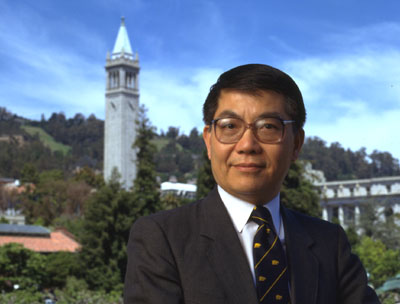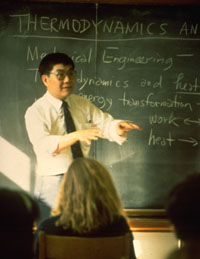|

John
Blaustein photo
Honoring
Chang-Lin Tien: A June 22 Symposium at Berkeley
19
June 2002
By
Robert Sanders, Media Relations
|
Watch
the Webcast
Live
from Sibley Auditorium
8:30 a.m.,
Saturday, June 22. |
 |
Berkeley
- Chang-Lin Tien, beloved former chancellor of the University
of California, Berkeley, will miss his retirement tribute
on Saturday (June 22), but his accomplishments and boundless
energy will be much in the thoughts of those attending.
Former
U.S. Secretary of Education Richard W. Riley, National
Science Foundation Director Rita R. Colwell, UC President
Richard C. Atkinson, former UC President Jack W. Peltason,
former UC Regent Ralph Carmona and numerous colleagues
of Tien's will join about 200 other guests, including
his wife, three children and their families, to celebrate
his life work.
Tien,
66, a University Professor emeritus and the NEC Distinguished
Professor Emeritus in the Department of Mechanical Engineering,
stepped down as chancellor in 1997 to return to his research
and to pursue other interests. Tragically, he was diagnosed
with a brain tumor in September 2000 and suffered a debilitating
stroke during surgery to remove it. He relinquished his
many duties on June 30, 2001.
The
day-long symposium, to be held in Sibley Auditorium at
the Bechtel Engineering Center, will feature a morning
of discussions about Tien's research accomplishments by
his engineering and scientific colleagues and former students.
The afternoon will be filled with talks about his legacy
to education and society, including tributes from Riley,
Colwell and William Wulf, president of the National Academy
of Engineering.
The
full symposium will be Webcast
live beginning at 8:30 a.m. Saturday.
Tien
was already an internationally recognized expert in heat
transfer and thermal science when he was appointed in
1990 as the first Asian American to lead a major American
research university. He shepherded the campus through
the toughest financial times in its history and through
major disputes over the use of affirmative action in admissions.
His
principled stand in favor of the use of affirmative action
drew praise and criticism from around the world, though
ultimately the UC Board of Regents, and later California
voters, elected to forbid such considerations.
Tien's
work in the area of heat transfer ranged from nuclear
power to the tiniest nanochip. He contributed to research
on space shuttle thermal tiles and evaluated reactor emergency
cooling after the partial meltdown at the Three Mile Island
nuclear power plant in Pennsylvania. More recently, Tien
founded an entirely new field - the study of heat transfer
in extraordinarily small, almost invisible micro/nano
devices, a field called microscale thermophysical engineering.
He
has received many honors, including the Max Jakob Memorial
Award, the highest international award in the field of
heat transfer, and appointment in 1999 as an esteemed
University Professor in the UC system. His name will grace
the planned East Asian Library and Studies Center at UC
Berkeley and already has been attached to a supertanker
and an asteroid. He was elected to the National Academy
of Engineering in 1976 and to the American Academy of
Arts and Sciences in 1991, and holds 12 honorary doctorates
from universities in the United States and abroad. And
in 1962, at the age of 26, Tien became the youngest professor
to win UC Berkeley's Distinguished Teaching Award.
| |

Peg
Skorpinski photo
|
More
about Chang-Lin Tien:
Bio
by the Mechanical Engineering Department:
A comprehensive summary of Tien's many research and educational
achievements.
Timeline
of Tien's milestones while chancellor.
AsianWeek:
"Time Out for Chancellor Tien": In a
1997 conversation with AsianWeek one week before his departure
from Berkeley for an extended tour of Asia, Tien talked
about the high and low points of his tenure, his impassioned
fight to preserve affirmative action, the current political
climate toward Asian Pacific Americans, and his brush
with national politics.
Bridges
with Asia: Asian Americans in the United States: Tien
presented this keynote address about affirmative action's
role in fighting discrimination to the Asia Society in
1996.
|